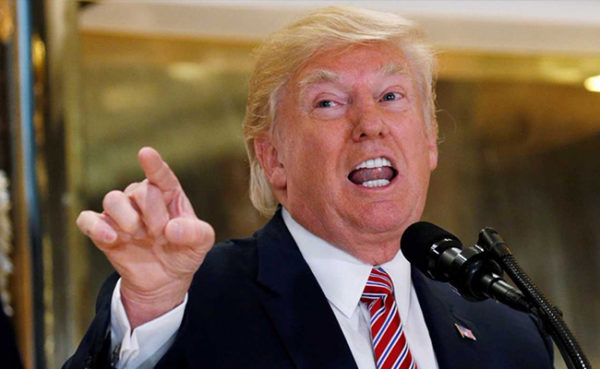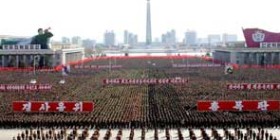President Trump lashed back Friday at North Korea’s leader, calling Kim Jong Un a “madman” whose regime will be “tested like never before” amid new U. S-imposed financial sanctions.
The latest economic pressures announced Thursday come as the Trump administration seeks to build international support for more aggressively confronting the rogue nation, whose escalating nuclear and ballistic missile capabilities have reached what U.S. officials consider a crisis point.
The new penalties seek to leverage the dominance of the U.S. financial system by forcing nations, foreign companies and individuals to choose whether to do business with the United States or the comparatively tiny economy of North Korea. U.S. officials acknowledged that like other sanctions, these may not deter North Korean leader Kim Jong Un’s drive to threaten the United States with a nuclear weapon, but is aimed at slowing him down.
Kim on Thursday reacted angrily to Trump’s remarks and actions this week, calling the president a “mentally deranged U.S. dotard” and Trump’s earlier speech at the U.N. “unprecedented rude nonsense.” Kim said that he was now thinking hard about how to respond.
“I will make the man holding the prerogative of the supreme command in the U.S. pay dearly for his speech,” Kim said in a statement released by the official Korean Central News Agency, which also published a photo of the North Korean leader sitting at his desk holding a piece of paper.
“I am now thinking hard about what response he could have expected when he allowed such eccentric words to trip off his tongue. Whatever Trump might have expected, he will face results beyond his expectation,” Kim said, saying that he would “tame” Trump “with fire.”
On Friday, Trump added the latest barb with a tweet calling Kim a “madman” who brings famine and death on North Koreans.
“Kim Jong Un of North Korea, who is obviously a madman who doesn’t mind starving or killing his people, will be tested like never before!” Trump wrote.
South Korea’s Yonhap News Agency reported Thursday night that the North’s foreign minister, Ri Yong Ho, said in New York that his country may test a hydrogen bomb in the Pacific Ocean to fulfill Kim’s vow to take the “highest-level” action against the United States. “It could be the most powerful detonation of an H-bomb in the Pacific,” Ri said. “We have no idea about what actions could be taken as it will be ordered by leader Kim Jong Un.” U.S. officials believe the North carried out its first hydrogen bomb test on Sept. 3.
Trump’s executive order grants the Treasury Department additional authority that Trump said would help cut off international trade and financing that Kim’s dictatorship uses to support its banned weapons programs.
“North Korea’s nuclear program is a grave threat to peace and security in our world, and it is unacceptable that others financially support this criminal, rogue regime,” Trump said in brief public remarks during a meeting with the leaders of South Korea and Japan to discuss strategy to confront Pyongyang.
He added that the United States continues to seek a “complete denuclearization of North Korea.”
Significantly, Trump also said that Chinese President Xi Jinping had ordered Chinese banks to cease conducting business with North Korean entities. Trump praised Xi, calling the move “very bold” and “somewhat unexpected.”
China is North Korea’s chief ally and economic lifeline. Some 90 percent of North Korean economic activity involves China, and Chinese entities are the main avenue for North Korea’s very limited financial transactions in the global economy. China is also suspected of turning a blind eye to some of the smuggling and sanctions-busting operations that have allowed Pyongyang to rapidly develop sophisticated long-range missiles despite international prohibitions on parts and technology.
All U.N. sanctions have to be acceptable to China, which holds veto power. China’s recent willingness to punish its fellow communist state signals strong disapproval of North Korea’s international provocations, but China and fellow U.N. Security Council member Russia have also opposed some of the toughest economic measures that could be applied, such as banking restrictions that would affect Chinese and other financial institutions.
“We continue to call on all responsible nations to enforce and implement sanctions,” Trump said.
Trump’s announcement came as he has sought to rally international support for confronting Pyongyang during four days of meetings here at the U.N. General Assembly. In a speech to the world body Tuesday, Trump threatened to “totally destroy” the North if necessary and referred derisively to Kim as “Rocket Man.” But the president and his aides have emphasized that they are continuing to do what they can to put economic and diplomatic pressure on North Korea to avoid a military conflict.
“We don’t want war,” U.N. Ambassador Nikki Haley told reporters. “At the same time, we’re not going to run scared. If for any reason North Korea attacks the United States or our allies, we’re going to respond.”
The new executive order signals the U.S. willingness to take a more aggressive approach to cutting off world trade with North Korea, even if other countries such as China aren’t willing partners in sanctions, because it would allow the United States to economically punish businesses anywhere in the world.
The executive order “opens the door for the U.S. to unilaterally enforce a trade embargo against North Korea,” said Joseph DeThomas, a former State Department official who focused on North Korea and Iran and is now a professor of international affairs at Pennsylvania State University. “It gives us the power to play that game if we wish to.”
In the past, Chinese officials have objected to suggestions that the United States could punish foreign companies trading with North Korea, but there are signs that China and the United States are becoming more agreeable on North Korea.
“The positive comments about China when [Trump] made the announcement indicates that there’s some good cooperation rather than confrontation,” DeThomas said.
DeThomas warned, however, that even if sanctions are adopted and enforced, the way ahead will be difficult, because North Korea may feel it has little choice, given the president’s bellicosity at the United Nations, but to proceed with its weapons program despite the pain of an embargo.
“If we stick with sanctions, it’s going to be a long ugly haul with lots of humanitarian costs,” DeThomas said.
A White House fact sheet said that under the executive order, airplanes or ships that have visited North Korea will be banned for 180 days from visiting the United States, a move to crack down on illicit trade.
“This significantly expands Treasury’s authority to target those who enable this regime . . . wherever they are located,” Treasury Secretary Steven Mnuchin said.
U.S. officials say there is still time and room for diplomacy if North Korea shows that talking could be productive. Other countries, including China and Russia, are pressing Washington to make a greater effort toward talks and an eventual bargain that could buy Kim out of his weapons without toppling his regime.
The shape of a possible deal has been evident for years, but Kim has raised the stakes, and perhaps the price, with his rapid development toward the capability to launch a nuclear-equipped intercontinental ballistic missile at U.S. territory.
Asked why North Korea might entertain such an international deal when Trump appears poised to undermine a similar one with Iran, Secretary of State Rex Tillerson said a North Korea deal would be designed very differently.
“While the threat is the same – it’s nuclear weapons – the issues surrounding North Korea are very different than the issues surrounding Iran,” Tillerson said Wednesday. “Iran is a large nation, 60 million people; North Korea is a smaller nation, the hermit kingdom, living in isolation. Very different set of circumstances that would be the context and also the contours of an agreement with North Korea, many aspects of which don’t apply between the two.”
In recent weeks, the Security Council has approved two rounds of economic sanctions but also left room for further penalties. For example, the sanctions put limits on the nation’s oil imports but did not impose a full embargo, as the United States has suggested it supports. The Trump administration has signaled it also wants a full ban on the practice of sending North Korean workers abroad for payments that largely go to the government in Pyongyang.
“We are witnessing a very dangerous confrontation spiral,” Russian Foreign Minister Sergei Lavrov said in a speech to the United Nations, filling in for President Vladimir Putin, who skipped the forum. “We resolutely condemn the nuclear missile adventures of Pyongyang in violation of Security Council resolutions. But military hysteria is not just an impasse; it’s disaster . . . There is no alternative to political and diplomatic ways of settling the nuclear situation on the Korean Peninsula.”
Mnuchin emphasized that “this action is in no way specifically directed at China,” and he said he called Chinese officials to inform them ahead of the U.S. announcement.
Mnuchin also said the unilateral U.S. action is not a rejection of separate Security Council sanctions and the international diplomacy they require. Similar to unilateral U.S. sanctions on Iran applied during the Obama administration, the new U.S. restrictions seek to leverage the power of the U.S. financial system.
“Foreign financial institutions are now on notice that, going forward, they can choose to do business with the United States or with North Korea, but not both,” Mnuchin said.
Sitting down with South Korean President Moon Jae-in before the trilateral discussion with Japan, Trump said the nations are “making a lot of progress.”
Moon praised Trump’s speech to the United Nations, saying through a translator that “North Korea has continued to make provocations and this is extremely deplorable and this has angered both me and our people, but the U.S. has responded firmly and in a very good way.”
The Security Council had also applied tough new export penalties in August, and Tillerson said Wednesday that there are signs those restrictions are having an economic effect.
“We have some indications that there are beginning to appear evidence of fuel shortages,” Tillerson said in a briefing for reporters. “And look, we knew that these sanctions were going to take some time to be felt because we knew the North Koreans . . . had basically stockpiled a lot of inventory early in the year when they saw the new administration coming in, in anticipation of things perhaps changing. So I think what we’re seeing is a combined effect of these inventories are now being exhausted and the supply coming in has been reduced.”
There is no sign, however, that economic penalties are having any effect on the behavior of the Kim regime and its calculation that nuclear tests and other provocations will ensure its protection or raise the price of any eventual settlement with the United States and other nations.
Trump said the United States had been working on the North Korea problem for 25 years, but he asserted that previous administrations had “done nothing, which is why we are in the problem we are in today.”






Leave a reply